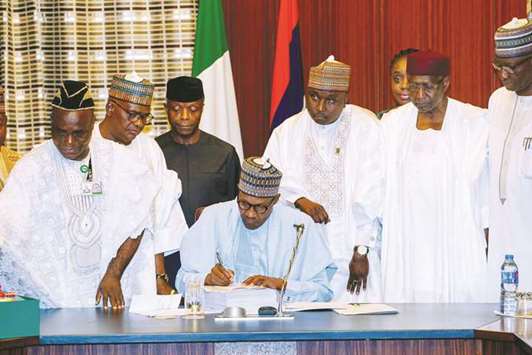Nigeria’s president signed a record 9.12tn-naira ($29bn) budget for 2018 into law yesterday but said he would use a supplementary spending plan to seek changes, creating uncertainty about the final details of his growth strategy. Muhammadu Buhari is pushing to foster growth in Nigeria, which has west Africa’s biggest economy, before an election next February in which he will seek a second term. His economic policies, and their impact on Nigerians, could sway voters.
Nigeria’s parliament, the National Assembly, passed the budget last month. The total sum is higher than the 8.6tn naira spending plan presented to parliament by Buhari in November, which lawmakers said was due to an increase in the assumed oil price to $51 per barrel from $45.
Buhari was critical of changes made by the National Assembly, which he said cut a total of 347bn naira for 4,700 projects submitted to them for consideration and introduced 6,403 projects of their own amounting to 578bn naira. He cited examples of funds being cut, including 8.7bn taken from a housing programme, and said lawmakers added projects that were not properly assessed. Buhari also said parliament increased its own budget from 125bn naira to 139.5bn naira.
“I have decided to sign the 2018 budget in order not to further slowdown the pace of recovery of our economy, which has doubtlessly been affected by the delay in passing the budget,” said Buhari in a speech after the signing. Nigeria, Africa’s top oil producer, emerged from its first recession in 25 years in 2017, helped by higher crude prices, but growth remains fragile. “It is my intention to seek to remedy some of the most critical of these issues through a supplementary and/or amendment budget, which I hope the National Assembly will be able to expeditiously consider,” Buhari said.
A spokesman for the lower house of parliament, the House of Representatives, said some projects put forward by the executive “do not meet the needs of the common man” and the legislature aimed to help those it represents. “The additional costs and projects to the budget were done in good faith for the sole purpose of improving the lives of Nigerians,” said the spokesman, Abdulrazak Namdas.
A spokesmen for the upper house of parliament could not immediately be reached. Budgets under Buhari, who took office in May 2015, have been Nigeria’s largest ever -- the latest is up from last year’s 7.44tn-naira spending plan. But economists say implementation has been poor and failed to provide the type of capital spending needed to improve infrastructure.
“Despite the approach of elections in early 2019, there is no reason to assume this time around that all of the spending plans will necessarily be executed,” said Razia Khan, chief Africa economist at Standard Chartered Bank.
She added that the plan for a supplementary budget was “likely to be because of some degree of uncertainty as to the value of all the spending projects that were proposed by the Senate and approved”. John Ashbourne, senior emerging markets economist at Capital Economics, said next year’s vote, in which some legislators will seek election, may have led to the insertion of some projects by lawmakers.
The International Monetary Fund in February said Nigerians were getting poorer despite the recovery from recession. Inflation has fallen for 16 straight months, slowing to a more than two year low of 11.6% in May .

Nigeria’s President Muhammadu Buhari signs the 2018 budget in Abuja, Nigeria.
